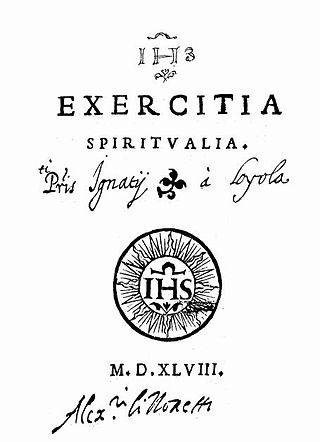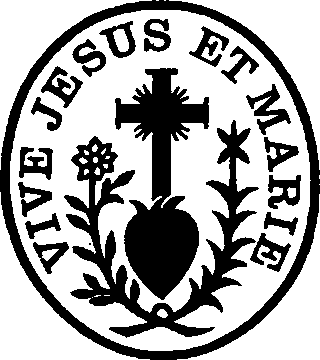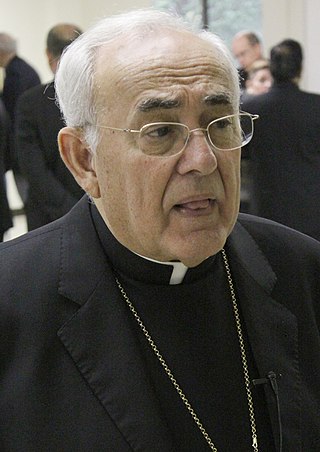Related Research Articles

The Society of Jesus, also known as the Jesuit Order or the Jesuits, is a religious order of clerics regular of pontifical right for men in the Catholic Church headquartered in Rome. It was founded in 1540 by Ignatius of Loyola and six companions, with the approval of Pope Paul III. The society is engaged in evangelization and apostolic ministry in 112 nations. Jesuits work in education, research, and cultural pursuits. Jesuits also conduct retreats, minister in hospitals and parishes, sponsor direct social and humanitarian ministries, and promote ecumenical dialogue.

Regimini militantis Ecclesiae was the papal bull promulgated by Pope Paul III on September 27, 1540, which gave a first approval to the Society of Jesus, also known as the Jesuits, but limited the number of its members to sixty.

Jan Philipp Roothaan, SJ was a Dutch Jesuit, elected twenty-first Superior-General of the Society of Jesus. Roothaan was a decisive figure in the reestablishment of the order after the Suppression of the Society of Jesus. He authorized the 1838 Jesuit slave sale, which saw over 200 enslaved people sold.

The Missionaries of the Precious Blood is a Catholic community of priests and brothers. The society was founded by Saint Gaspar del Bufalo in 1815.

The Spiritual Exercises, composed 1522–1524, are a set of Christian meditations, contemplations, and prayers written by Ignatius of Loyola, a 16th-century Spanish Catholic priest, theologian, and founder of the Society of Jesus (Jesuits).
Francis Alfred Sullivan was an American Catholic theologian and a Jesuit priest, best known for his research in the area of ecclesiology and the magisterium.
A fourth vow is part of religious vows that are taken by members of some religious institutes in the Catholic Church, apart from the traditional vows based on the evangelical counsels: poverty, chastity and obedience or their equivalents stability, conversion of manners, and obedience.
Tertianship is the final period of formation for members of the Society of Jesus. Upon invitation of the Provincial, it usually begins three to five years after completion of graduate studies. It is a time when the candidate for final vows steps back to assess his experience of living and working in the Society of Jesus and to discern whether this is the life to which he is being called by Christ. The Constitutions of the Society indicate that
after completing his studies, the scholastic should apply himself to the schola affectus, by turning now to "spiritual and corporal" works, which will help him to make progress in humility and in the denial of selfishness and self-will or self-opinionatedness.

Consecrated life is a state of life in the Catholic Church lived by those faithful who are called to follow Jesus Christ in a more exacting way. It includes those in institutes of consecrated life, societies of apostolic life, as well as those living as hermits or consecrated virgins.

The Sodality of Our Lady, also known as the Sodality of the Blessed Virgin Mary, is a Roman Catholic Marian society founded in 1563 by young Belgian Jesuit Jean Leunis at the Roman College of the Society of Jesus. The modern Ignatian lay group Christian Life Community traces its origins to the first Sodality.
An institute of consecrated life is an association of faithful in the Catholic Church canonically erected by competent church authorities to enable men or women who publicly profess the evangelical counsels by religious vows or other sacred bonds "through the charity to which these counsels lead to be joined to the Church and its mystery in a special way". They are defined in the 1983 Code of Canon Law under canons 573–730. The Congregation for Institutes of Consecrated Life and Societies of Apostolic Life has ecclesial oversight of institutes of consecrated life.

The Congregation of Jesus and Mary, abbreviated CIM or (CJM) also known as the Eudists, is a society of apostolic life of Pontifical Right for men in the Catholic Church. It was established on March 25, 1643 by Saint Fr. John Eudes, C.I.M.
Exposcit Debitum is the title of the Papal bull that gave a second and final approval to the foundation of the Society of Jesus. It was issued by Pope Julius III on 21 July 1550. It replaced Regimini militantis Ecclesiae of 1540. The structure of the text is the same but, based on 10 years experience, some modifications were introduced:
- the limitation to 60 members was dropped;
- it allowed the admission of Coadjutors, that is: zealous but uneducated priests and competent lay people desirous to offer their life for an apostolic service The temporal coadjutors have always taken the same three vows of religious life, and are nowadays called 'Jesuit Brothers';
- Defence of the faith is added to its Propagation as an aim of the Society of Jesus.

The Roman Catholic Archdiocese of Cagayan de Oro is an archdiocese of the Catholic Church in the Philippines.

Álvaro Corrada del Río, S.J. is a Puerto Rican prelate of the Catholic Church and member of the Society of Jesus.

The Rachol Seminary, also known as Patriarchal Seminary of Rachol, is the diocesan major seminary of the Primatial Catholic Archdiocese of Goa and Daman in Rachol, Goa, India.
In the Catholic Church, a religious institute is "a society in which members, according to proper law, pronounce public vows, either perpetual or temporary which are to be renewed, however, when the period of time has elapsed, and lead a life of brothers or sisters in common."

Jesuit formation, or the training of Jesuits, is the process by which candidates are prepared for ordination or brotherly service in the Society of Jesus, the world's largest male Catholic religious order. The process is based on the Constitution of the Society of Jesus written by Ignatius of Loyola and approved in 1550. There are various stages, from a novice, to studying, to full-time work and a return to studies before ordination as a priest or final profession as a brother. They are formed spiritually, academically and practically for the ministries they offer the Church and world.

Ferdinand Perier, SJ, was a Belgian Jesuit priest, a missionary in British India, and the third Archbishop of Calcutta.

The Comboni Missionaries of the Heart of Jesus, also known as the Comboni Missionaries of the Sacred Heart, or the Verona Fathers, and originally called the Sons of the Sacred Heart of Jesus, is a Catholic clerical male religious congregation of pontifical right.
References
Bibliography
- Padberg, John, ed. (1996), The Constitutions of the Society of Jesus and their Complementary Norms: A Complete English Translation of the Official Latin Texts, St. Louis: The Institute of Jesuit Sources